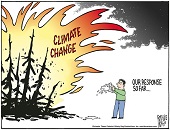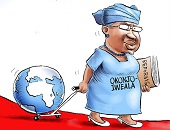COP 26: The End Game
“The first week is usually a disappointment,” said Catherine Brahic, environment editor at the Economist magazine, “but this [second] week, the attendees are pushing ahead the goals. Now we are in the end game.” On November 11, 2021, the Economist magazine sponsored a webinar featuring two panellists: an editor and a science writer. Before an audience of thousands, each gave a firsthand account of what they had been seeing while they attended the 26th United Nations Climate Change conference, commonly referred to as COP 26, in Glasgow, Scotland. “The drafts of the papers have come out—they look simple for starters,” Brahic said, […]
The Decisive Decade
Raging, uncontrollable forest fires. Prolonged heat domes, causing hundreds of deaths. Catastrophic storms. Flash floods. These are just a few of the effects of climate change being felt this year. Are the countries of the world acting quickly enough to prevent irreversible damage? Two months ahead of the upcoming COP26 negotiations in Glasgow, two editors from the magazine the Economist discussed their expectations of this crucial conference in a webinar on September 23, 2021, before an audience of hundreds. Oliver Morton, the Economist’s Briefings senior editor, and Catherine Brahic, Environment editor, discussed the recent findings of the latest Intergovernmental Panel on Climate […]
Net-Zero Buildings
How do we build our homes and cities for a sustainable future? Climate change is such a huge, complex problem that tackling it can seem overwhelming. Fortunately, many organizations are addressing various parts of this colossal puzzle. One aspect is the “built environment.” Can existing buildings be modified to cope with climate change? Can buildings be redesigned to have net zero effect on the environment? On July 1, 2021, a panel of experts gave their thoughts on matters relating to climate change and buildings, as part of the New York Times Climate Hub series of webinars. This is the “Built […]
WTO: The Jabs and the Jab-Nots
As the covid-19 vaccines continue to be rolled out across the world, and as trade disputes continue to fester, Ngozi Okonjo-Iweala has her work cut out for her as the new director-general of the World Trade Organisation (WTO). With many years’ experience in politics, economics, and vaccine production, she already has a deep understanding of the issues. On June 29, 2021, she spoke with Zanny Minton Beddoes, editor-in-chief of the magazine the Economist, about ending the covid-19 pandemic and the future of globalization. Ngozi described herself as a “trade outsider” when she first began at the World Bank, “which has […]
From Ideas to Action
Climate change will reshape how financial organizations and investors think about climate-related events. But how will we deal with climate change risk? How will financial organizations respond to increasing demands for transparency, measurement, and action? On February 2, 2021, the Institutional Asset Management Committee of the CFA Society of Toronto convened a webinar with three seasoned experts who discussed how best to move into a world of green initiatives. The session was opened by Brandon Gill, Senior Portfolio Manager, Capital Markets Group, External Public Investments and Credit at OPTrust, the pension trust fund of the Ontario Public Service Employees Union. […]
Climate Risk Survey
Investors continue to ask for more investment strategies that target environment and sustainability. When it comes to capability to manage financial risks due to climate change, how far along are firms in addressing the issues? The second annual global survey of climate risk management at financial firms, sponsored by the Global Association of Risk Professionals (GARP), was presented in a webinar on September 22, 2020. The report is co-authored by Jo Paisley, Co-President, and Maxine Nelson, Senior Vice President at GARP. Paisley began by taking a quick poll of the audience, chiefly GARP members. “Why are you interested in the […]
Healthy skepticism
Selecting environmental, social, and governance (ESG) funds is a way that ordinary citizens can invest in an ethical way. But what does the increased interest in ESG investing shown by institutional and private wealth clients really mean? Is it paying off? Are we at a watershed moment for structural change in the way investors allocate resources? The move to consider ESG investing came some years ago with scandals such as Enron, and continues with more scandals such as Volkswagen’s Dieselgate and Facebook’s meddlings, said Pedro Matos, a professor of finance at University of Virginia and the author of the CFA […]
Inside Story, South America
How are different parts of the world reacting to the Covid-19 Pandemic, and how does that affect those who must analyze and report on global geopolitical risk? The magazine The Economist presented a webinar on May 28, 2020, titled “Inside Story: Reporting on the Covid-19 Pandemic Around the World.” Helen Joyce, executive editor for events at The Economist, interviewed two outstanding foreign correspondents. This is part two of a two-part summary. The second panellist was Sarah Maslin, foreign correspondent for The Economist, South America. She spoke from her home in São Paulo, which is decorated with scarves from soccer teams […]
The Uninhabitable Earth
The Uninhabitable Earth: Life After Warming by David Wallace-Wells was launched a year ago—on February 19, 2019. It is both a travelogue of the near future and a meditation on how that future will look to those living through it—the ways that climate change promises to transform global politics, the meaning of technology and nature in the modern world, the sustainability of capitalism, and the trajectory of human progress. Interest has spread rapidly in the year since its publication. It was named one of the best books of the year by a host of top publications: The New Yorker, The New York Times […]
Top 5 Trends in Risk Management
The champagne has been drunk, and the New Year has been rung in. What trends are predicted in risk management as we welcome the new decade? “In 2020, we’ll likely see significant changes in risk models, processes and functions,” predicts Brenda Boultwood, Risk Advisory Partner at Deloitte. As a senior expert in risk culture and corporate governance, she published an article online January 10, 2020, for the Global Association of Risk Professionals (GARP). We present the highlights and a link to the full article below. The three lines of defense business model, as we know it, will end This is actually […]










